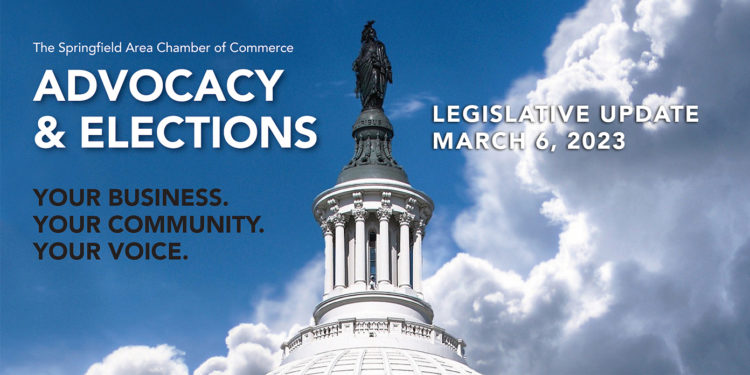Legislative Update: March 6, 2023

We’re monitoring Oregon’s 2023 legislative session for issues of impact and interest to our members. Here’s the latest update from our legislative counsel at the Oregon State Chamber of Commerce (OSCC).
The 2023 Legislative Session is now hitting peak intensity. There are now about 3,000 bills in the process. Committees are considering a full slate of bills with each committee meeting, and amendments are starting to fly.
The legislature is about a month away from the halfway mark as policy bills must be passed out of their initial committee by April 4th. This deadline spurs extreme activity, as nothing is off the table – there are 3,000 vehicles spread over 25 committees – and everyone is trying their best to put their bills in a position to succeed.
Key early legislative work thus far has focused heavily on putting together a housing policy and funding package to address homelessness and the housing crisis (House Bill 2001). Legislators are also working on a package of incentives to help attract and revitalize Oregon’s semiconductor industry (Senate Bill 4). Other anticipated legislative priorities will focus on behavioral health, remedying a shortage of public defenders, and potentially tolling along I-5 and I-205. Session will adjourn no later than Sunday, June 25th.
The Governor outlined her official budget for the 2023-25 biennium on February 2nd. The budget was seen as a pragmatic and focused proposal with key investments matching the top priorities she campaigned for – housing, behavioral health, and education. The proposed budget includes $1 billion to address the housing and homelessness crisis. Her proposed K-12 budget comes in at $9.9 billion – more than the $9.5 billion current service level budget, but short of the $10.3 billion being sought by school advocates. Other notable priorities include $40 million to support the public defense system and $200 million aimed at incentivizing semiconductor production in Oregon.
The Governor’s overall spending plan calls for about $32 billion in spending. Legislators will have about $31.4 billion in General Fund and Lottery cash to spend. Governor Kotek proposes to make up the difference by diverting about $765 million scheduled to be deposited into various reserve funds on June 30th into the General Fund.
Recent revenue forecasts show that Oregon isn’t heading toward the recession many feared, so legislators may be spared the difficult task of cutting budgets. Perhaps the most notable feature of the Governor’s budget is that it doesn’t propose any real tax increases or program cuts.
One very unique feature of the 2023 session thus far is that we are seeing a massive amount of so-called “placeholder” bills. Many concepts have not been vetted or worked during the interim – and legislators are rapidly working to try and flush out details on the different policies they’d like to advance. This has created a rather chaotic approach to legislating, especially in some key areas like energy policy where there are an infinite number of vague “green” policies but no clear direction or priority of take-home policies.
Where OSCC has serious concern
Hands down, OSCC continues to have the most concerns with the environmental regulatory bills we are seeing considered in the House Committee on Climate, Energy and Environment.
We’ve documented our concerns regarding HB 2396 – a job-killing bill that would authorize DEQ to create an “indirect source” review program that would regulate projects that promote vehicle traffic or require off-road engines. OSCC opposed HB 2396.
HB 3158 would create a slew of new taxes and fees to fund an incentive program for non-road diesel vehicles. Among other things, the bill puts a new tax on tires and on the purchase and rental of diesel equipment. OSCC opposed HB 3158.
HB 3152 begins the process of a statewide ban on the use of natural gas in the residential housing sector. OSCC opposed HB 3152.
HB 3229 is a major DEQ fee increase on manufacturing facilities for the Title V air emissions program. The proposed fee increase is 80% and purports to save the positions of DEQ regulators at the expense of manufacturing companies throughout the state.
HB 3196 is of real concern as it authorizes DEQ to collect fees from regulated entities to defray the “costs to the department of administering and overseeing those portions of the climate protection program related to community climate investments.” This is a concern for many reasons, one of which is that it appears to provide statutory authority for DEQ rulemaking – the Climate Protection Program – that is the subject of litigation.
OSCC ACTION ALERT
OSCC will be issuing an Action Alert on HB 3152 when it re-appears again for another public hearing.
HB 3152 is a bill that phases out the use of natural gas in the residential housing sector. It establishes that the policy of Oregon is to protect residential utility customers from risks of stranded fossil fuel assets and potential increases in energy burden while achieving state’s GHG emissions reduction goals.
HB 3152 prohibits, on or after January 1, 2026, use of funding from ratepayers to provide incentives or subsidies for the purchase or installation of gas appliances or devices for use by residential utility customers. It also prevents line extension allowances for new gas line extensions that support the use of gas in residential buildings.
HB 3152 is awaiting a full public hearing. A public hearing was started on Wednesday, March 1st, but only the Citizens Utility Board (CUB) was allowed to testify because they ran out of time.
The bill is sponsored by Chair Pam Marsh (D-Ashland) so we anticipate additional hearings to be scheduled soon.
OSCC, the Washington County Chamber of Commerce, Beaverton Area Chamber of Commerce, and Salem Area Chamber of Commerce have all submitted testimony.
OSCC will alert you for your next opportunity to make your voice heard on this issue for your members.
(Note: testimony is currently not being accepted for HB 3152 until it is scheduled again for subsequent hearing.)
The Springfield Chamber of Commerce will be publishing the OSCC’s legislative updates weekly, or as received. Any opinions expressed or implied are those of OSCC and do not necessarily reflect those of the Springfield Chamber or its representatives. If you’d like more information, please visit our Advocacy & Elections Page.
Discover more from Springfield Bottom Line
Subscribe to get the latest posts sent to your email.





